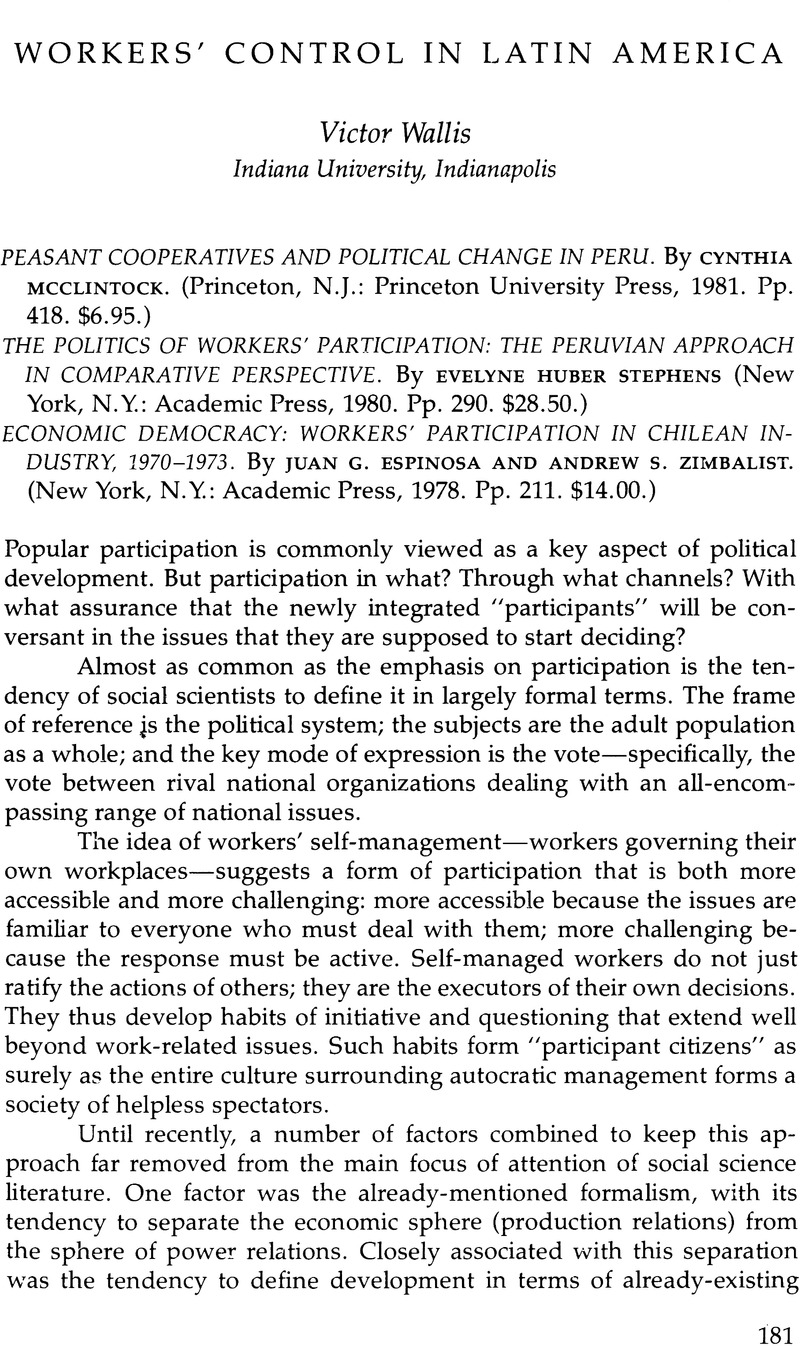No CrossRef data available.
Article contents
Workers' Control in Latin America
Review products
Published online by Cambridge University Press: 24 October 2022
Abstract

- Type
- Review Essays
- Information
- Copyright
- Copyright © 1983 by the University of Texas Press
References
Notes
1. On the interrelationship of these issues, see Barry Commoner, The Poverty of Power (New York: Knopf, 1976).
2. See John W. Gurley, “Maoist Economic Development: The New Man in the New China,” in Charles K. Wilber, ed., The Political Economy of Development and Underdevelopment, second ed. (New York: Random House, 1979), pp. 334-46.
3. See Phil Mailer, Portugal: The Impossible Revolution (Montreal: Black Rose Books, 1977); and Basil Davidson, “The Revolution of People's Power: Notes on Mozambique, 1979,” Monthly Review 32, 3 (July-Aug. 1980):75-87.
4. In addition to the works under review, two articles are of interest for their overviews of the Velasco program: Peter T. Knight, “New Forms of Economic Organization in Peru: Toward Workers' Self-Management,” in Abraham F. Lowenthal, ed., The Peruvian Experiment: Continuity and Change under Military Rule (Princeton, N.J.: Princeton University Press, 1975), pp. 350-401; and Aníbal Quijano, “La ‘Segunda Fase de la Revolución Peruana’ y la lucha de clases,” Sociedad y Política 5 (Nov. 1975):4-19.
5. Pertinent works in addition to the Espinosa-Zimbalist study and the literature cited therein include: Michel Raptis, Revolution and Counter-Revolution in Chile: A Dossier on Workers' Participation in the Revolutionary Process (London: Allison & Busby, 1974), which includes the text of the “Basic Norms of Participation”; Peter Winn, “Loosing the Chains: Labor and the Chilean Revolutionary Process, 1970-1973,” Latin American Perspectives 3, 1 (Winter 1976):70-84; and Gabriel Smirnow, The Revolution Disarmed: Chile, 1970-1973 (New York: Monthly Review Press, 1979), especially chap. 6.
6. For a more general discussion of this issue, see Victor Wallis, “Workers' Control and Revolution,” Self-Management 6, 1 (Fall, 1978):15-28.
7. Terry Karl, “Work Incentives in Cuba,” Latin American Perspectives 2, 4 (1975):21-41; Andrew Zimbalist, “Worker Participation in Cuba,” Challenge (Nov. -Dec. 1975):45-54.
8. Marta Harnecker, ed., Cuba: Dictatorship or Democracy? (Westport, Conn.: Lawrence Hill, 1979), pp. 1-27.
9. An important source that appeared since the completion of this article is La autogestión en América Latina y el Caribe, ed. Santiago Roca T. (Lima: Consejo Latinoamericano y del Caribe para la Autogestión, 1981), 632 pp. This volume contains the papers presented at the second international conference on autogestión in Latin America and the Caribbean. It may be ordered from the publisher for US $15 (Latin America) or US $20 (elsewhere) at the following address: Casilla 4822, Lima 18, Peru. (The price includes airmail postage.) The same organization also publishes a newsletter entitled Autogestión y Participación.


